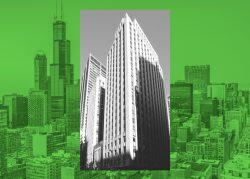Subleasing requires substitute tenants, and in Chicago those are tough to find right now.
The first two months of 2022 set a new high for the amount of office space available for sublease in Chicago’s central business district, as new offerings are being made faster than properties already on the secondary market can find takers, according to a report by MBRE.
The amount of office sublease space declined slightly between the third and fourth quarters last year, then has increased again since the start of 2022. It hit almost 5.9 million square feet across 351 total spaces, and no subleases for more than 20,000 square feet have been signed so far this year, the report said.
The second quarter of last year set the previous record high at just more than 5.8 million square feet, meaning the recent additions to the sublease market just edged that figure. Previously, the record was a little more than 4.2 million square feet set in the third quarter of 2009 amid the Great Recession.
Tenants have been able to negotiate from a stronger position than perhaps ever before for commercial space.
“Because of the unstable rent situation that these landlords and tenants are in, they need to make up for lost time and they’re at the mercy of whoever sees the opportunity,” said Saira Mohan, who represents retail clients for Colliers International.
Filling spots marketed for sublets may require rethinking the types of commercial tenants that could do business in buildings traditionally reserved solely for office workers, a prospect that excites real estate brokers like Mohan.
“I have been approached by quite a few landlords and developers in the office sector asking me what retail tenants or quick service restaurants could be a good fit for their boring lobbies or boring buildings as they are currently,” she said.
The rise in sublease listings means Chicago’s market could be falling behind other cities in North America, as the continent’s inventory declined by almost 5 percent in the fourth quarter of 2021. Chicago’s sublease market also shrunk by 1 million square feet during that period, according to a Cushman & Wakefield report last month.
“The timing matches a similar path to the previous two recessions when sublease space increased for approximately two years before hitting its highest point and then receding,” the Cushman report said.
Shops, food services, and even entertainment ventures like pop-up attractions and art or museum exhibits, might have chances to temporarily sublease spots in blocks of buildings where businesses shed office space as many started remote work setups.
“Occupiers were much more active with office leasing in 2021, partially due to favorable effective rental rates, particularly in the sublease market,” the Cushman report said. “Additionally, given the uncertainty related to how more agile workforces may look in a few years, the shorter lease terms often required with a sublease are currently considered a benefit by some occupiers.”
Opportunities Mohan pictures for repurposing offices into other commercial uses were rare before the pandemic emptied Chicago’s downtown, when pricing and lease terms weren’t as flexible as those offered by subleases and locked out many potential tenants like retailers wanting spaces in lobbies, second or third floors.
“Subleases are certainly not going at the rents that the office users were paying initially. There is a ton on the market and there are many deals to be had for the right business,” Mohan said.
Another potential client pool the sublease market could serve more effectively than a traditional commercial lease are marijuana companies. The publicly traded cannabis business Verano Holdings is in talks to sublease 24,000 square feet at 515 North State Street, Crain’s reported, citing people familiar with the company’s search.
If a deal goes through and Verano relocates to one of two sublease offerings in the building from its headquarters at 415 North Dearborn Street, it would represent a breakthrough for cannabis companies, which have never before inked a lease for Chicago’s top-tier buildings because marijuana’s continued status as a federally illegal substance gives pause to landlords’ lenders, especially institutional banks vigilant about following federal guidelines.
Chicago’s central business district sublease market grew by 137,416 square feet between the start of the year and the end of last month, the MBRE report said. Some of the larger offerings include HCSC advertising 63,786 square feet at the Aon Center at 200 East Randolph Street, Motorola marketing 53,549 square feet at 500 West Monroe Street, and Dentsu advertising 41,808 square feet that might be partially taken by the Verano cannabis venture at 515 North State.
Sublease offerings are most concentrated in the West Loop, where almost 2.4 million square feet, or 40 percent of all available sublease space in the central business district was located, the MBRE report said. The East Loop and River North had the next most space on the secondary market at 17 percent each.
Read more

